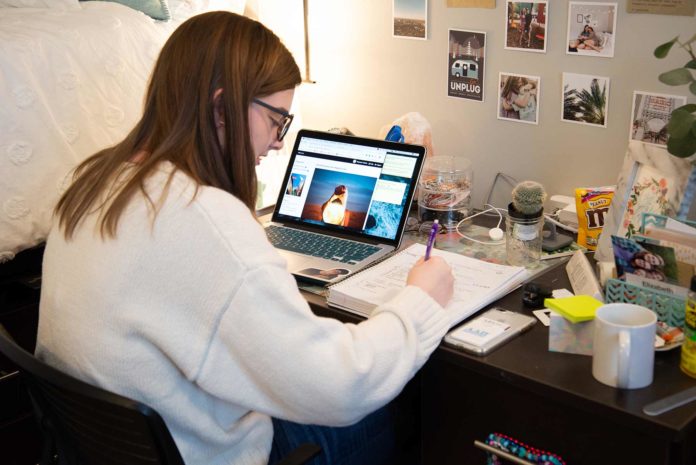Amid developments related to the spread of the COVID-19 novel coronavirus, Mercer students will begin receiving online instruction for their courses March 23. Tackling school assignments from home can be a challenge and an adjustment, but some simple steps and prep work can help make the transition easier.
Here are five tips for students working remotely from Dr. Pam Brewer, professor and director of the M.S. in Technical Communication Management program, and Dr. Susan Codone, director of Mercer’s Center for Teaching and Learning.
1. Establish an online presence.
An online presence is just as important as a face-to-face presence, Dr. Brewer said. Let your professors and classmates know that you are there and active through regular online updates.
“Build trust online by having a strong presence. You can achieve your goals much more effectively if you have the trust of your peers (and professors),” said Dr. Brewer, author of the book “International Virtual Teams: Engineering Global Success.”
For the best results, communicate through a combination of media formats that are rich in social cues, such as web conferences, and formats that are lean in social cues, such as email.
Don’t let more than 24 hours pass before you respond to a message or request. If someone asks you for something you can’t provide immediately, let them know you received their message and will get back to them by a certain day.
2. Communicate often.
Mercer professors will be communicating clearly and regularly with you through live video sessions, email, phone calls, virtual office hours and other methods, Dr. Codone said. You should also communicate with your professors frequently and share any concerns or questions as they arise, especially if you have encountered technical issues.
“Metacommunicate: That is, communicate about communication,” Dr. Brewer said. “Ask your peers if the communication is working for them and ask them what might need to change.”
Maintain connections and relationships with other students through Zoom, Canvas and other electronic methods, Dr. Codone said. Having periodic virtual meetings with your class groups is a great way to increase productivity, Dr. Brewer said. For instance, if you’re working on a team project, you might want to have short video meetings once or twice a week.
3. Cut down on distractions.
Set yourself up to be as distraction-free as possible during virtual meetings, and make sure that you aren’t contributing unwanted noise, Dr. Brewer said. For example, constant movement could be a distraction to others, and shuffling papers could make it hard for others to hear the conversation. Don’t forget about the option to mute your microphone until you need to speak.
“When you’re in an online meeting, be in the meeting,” she said.
In addition, it’s important to manage social media use so that it doesn’t interfere with your ability to study and prepare for class, Dr. Codone said.
4. Set a schedule and goals.
Try to stick to a normal sleep schedule, and don’t forget to eat well and stay hydrated, Dr. Codone said. Plan specific times for study or classwork and stick to that schedule. Keeping a consistent schedule and pace at home ensures you don’t overwork yourself.
A schedule can also help you stay productive. Decide that you are going to sit down and focus for a set amount of time, give yourself a little break, and then return to your task, Dr. Brewer said. Establishing goals at the beginning of your day can also help keep you motivated.
5. Set up your workspace and tech.
Set up a specific area to do your schoolwork, such as a desk or other workspace but preferably not on your bed. It’s also important to make sure the equipment and computer programs you’re using for virtual work is up to date, Dr. Codone said.
Watch tutorials or read up on programs required for assignments if you don’t know how to use them. The Mercer Information Technology Department has a number of online resources available, including trainings for Zoom and Canvas.










